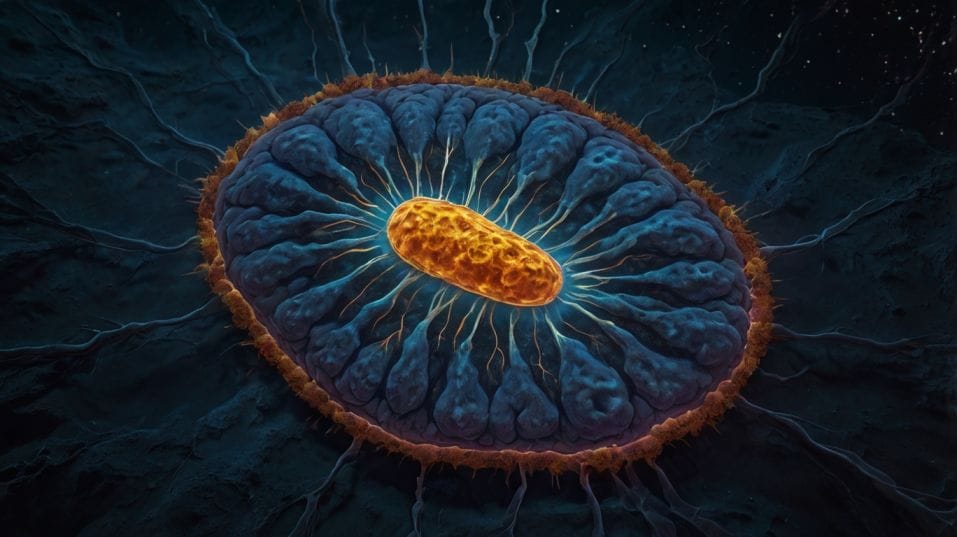How Quality Sleep Supports Mitochondrial Health
Unlock deeper energy, faster recovery, and sharper focus by improving your sleep. Discover how quality rest powers your mitochondria—nightly.

What if the secret to better energy isn’t what you do during the day—but what happens while you sleep? Forget willpower and stimulants.
Your body restores energy, focus, and resilience at night through a process that starts at the cellular level. It all hinges on one powerful force: your mitochondria.
These tiny engines run your life—and deep, high-quality sleep is what keeps them in top gear. Ready to feel sharper, stronger, and more recovered by tomorrow?
Mitochondria: Your Cellular Power Source
Let’s cut through the fluff. Mitochondria are the engines inside nearly every cell in your body. Their job? Turning oxygen and nutrients into ATP (adenosine triphosphate)—pure energy your body uses to move, think, and rebuild.
If ATP is fuel, mitochondria are the factories. When they’re running well, you feel alert, strong, and on point. When they’re not? You drag through your day, your recovery stalls, and even your mood takes a hit.
But here’s the kicker: mitochondria aren’t self-sustaining. They break down, take on damage, and lose efficiency over time. What keeps them sharp?
Deep, high-quality sleep. Sleep is when mitochondrial maintenance happens—cleaning out the old, reinforcing the strong, and fueling your next high-output day.

Sleep Is Cellular Recovery—Not Just Rest
Think of your sleep as a nightly pit stop. While you’re unconscious, your body is busy: repairing tissues, regulating hormones, cleaning up waste, and—critically—tuning up mitochondria.
This includes a process called mitophagy, where damaged or sluggish mitochondria are broken down and replaced. It's your body’s way of upgrading at the cellular level.
During deep sleep, growth hormone surges. This helps rebuild muscles and tissues, but it also signals mitochondrial regeneration.
You can’t supplement your way into this. You can’t hack it with an extra espresso. This happens when you’re out cold—specifically, in stages 3 and 4 of non-REM sleep, known as slow-wave sleep.
Shortchange this part of your sleep cycle, and you don't just feel groggy—you miss the opportunity to rebuild your energy system from the inside out.
That’s not a future problem. That’s a “why do I feel so tired even after a full night’s sleep?” problem.
Circadian Rhythm and Mitochondrial Timing
Here’s what most people miss: your mitochondria don’t just work—they respond. They sync to your circadian rhythm, your internal body clock that runs on a roughly 24-hour cycle.
This rhythm controls when hormones like melatonin and cortisol rise and fall, but it also guides mitochondrial function.
When you stay up too late, stare at screens all night, or shift your sleep schedule constantly, you confuse this clock.
That throws your mitochondria off. They stop working as efficiently, because the signals they rely on—light, temperature, eating times—are out of sync.
Fixing this is simple. Anchor your sleep and wake times. Get natural sunlight in the morning. Dim the lights at night. Signal your body when it’s time to power up—and when it’s time to shut down.
Real-World Sleep Upgrades That Fuel Mitochondria
Let’s be clear: you don’t need to overhaul your life. You need smart, consistent moves that support mitochondrial repair and energy output. Here’s how to get it done in the real world.
Set a strict wind-down window
Give yourself a hard cut-off an hour before bed—no screens, no stimulation, no scrolling.
Your body needs that quiet period to start producing melatonin, the hormone that cues sleep and triggers deeper rest. Without it, your brain stays too wired for deep recovery.
Cool your sleep environment
Mitochondrial repair kicks in most effectively during slow-wave sleep, and that’s easier to reach when your body temperature drops.
A room around 65°F (18°C) helps your core temperature drop quickly, sending a strong signal to start the sleep cycle.
Eat earlier
Late-night meals spike blood sugar and delay melatonin. They also force your mitochondria to stay active processing food when they should be in cleanup mode.
Finish your last meal 2–3 hours before bed. Let your system shift fully into repair, not digestion.
Ditch the late caffeine
Obvious but often ignored—caffeine blocks adenosine, the compound that builds sleep pressure throughout the day. Cut it off by mid-afternoon if you want to feel sleepy when it actually matters.
Move your body during the day
Physical activity boosts mitochondrial biogenesis (the creation of new mitochondria). It also improves sleep quality.
Even 20 minutes of sunlight and movement in the morning helps lock in your circadian rhythm, making it easier to fall asleep and stay there.
Get real about consistency
Weekend sleep binges don’t fix weekday sleep debt. In fact, they can make it harder to fall asleep the next night. Mitochondria thrive on rhythm.
Give them the same signals at the same time, and they respond with more energy, faster recovery, and sharper focus.
Sleep Is the Gateway to High Performance
You’re not tired because you’re doing too much. You’re tired because you’re not recovering well enough. And it’s not your fault—modern life is built to disrupt sleep. But the solution isn’t complicated.
You just need to create an environment and routine that helps your body do what it already knows how to do: repair, recharge, and come back stronger.
When sleep improves, so does everything else. You think faster. You move better. You bounce back from stress without crashing. That’s mitochondrial health in action—and it’s yours to control, night after night.
Final Thoughts
Your mitochondria don’t need more motivation. They need better conditions. Sleep is where the magic happens—where energy is restored, clarity is sharpened, and your body finally gets the green light to repair.
Start by making your evenings a little quieter, your lights a little dimmer, your schedule a little more consistent. Let your biology catch its breath. Let your mitochondria get to work.
No hacks. No gimmicks. Just real sleep, the way your body was built to do it. Start tonight. Turn down the lights. Put the phone away. Get serious about sleep—and watch what happens to your energy, your focus, and your momentum.




